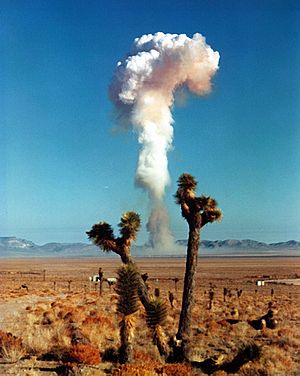Operation Hardtack II facts for kids
Quick facts for kids Operation Hardtack II |
|
|---|---|
| Information | |
| Country | United States |
| Period | 1958 |
| Number of tests | 37 |
| Test type | balloon, dry surface, tower, underground shaft, tunnel |
| Max. yield | 22 kilotonnes of TNT (92 TJ) |
Operation Hardtack II was a series of 37 nuclear tests carried out by the United States in 1958. These tests happened at the Nevada Test Site. They took place after another series called Operation Argus and before Operation Nougat.
At this time, countries were thinking about stopping nuclear tests. So, American scientists rushed to test many new weapon designs. They had a strict deadline: midnight on October 31, 1958. This was because talks to stop testing were going to start that day. The schedule shows how busy they were, with 29 tests done in October, and four of those on the very last day! One test was even canceled because bad weather pushed it past the deadline.
After Operation Hardtack II ended, the United States announced it would stop testing for a while. The Soviet Union also agreed to stop after two more tests on November 1 and 3. But in September 1961, the Soviet Union started testing again. This included the test of the Tsar Bomba, the most powerful nuclear device ever made. After this, the United States also started testing again with Operation Nougat.
What Happened During the Tests?
Operation Hardtack II involved 37 nuclear tests. Scientists used different ways to set off the devices. Some were sent up in balloons, others were placed on towers, or on the dry surface of the ground. Many were also set off deep underground in shafts or tunnels.
The main goals of these tests were to develop new weapons and to check their safety. Some tests were called "safety experiments." These checked if a nuclear device would accidentally explode with full power if something went wrong. Other tests were for "weapons development," meaning they were trying out new designs for nuclear bombs.
Many of these tests had a very small "yield." The yield is how much energy the explosion releases. It's like how powerful a firecracker is, but on a much bigger scale. For example, some tests had a yield of only a few tons of TNT. The largest test in this series, called Blanca, had a yield of 22 kilotons. One kiloton is equal to the explosive power of 1,000 tons of TNT.
Scientists learned a lot from these tests. They found out which designs were safe and which needed more work. Some tests didn't work as expected, but even those helped scientists understand more about nuclear weapons.
See also
 In Spanish: Operación Hardtack II para niños
In Spanish: Operación Hardtack II para niños
 | Misty Copeland |
 | Raven Wilkinson |
 | Debra Austin |
 | Aesha Ash |


